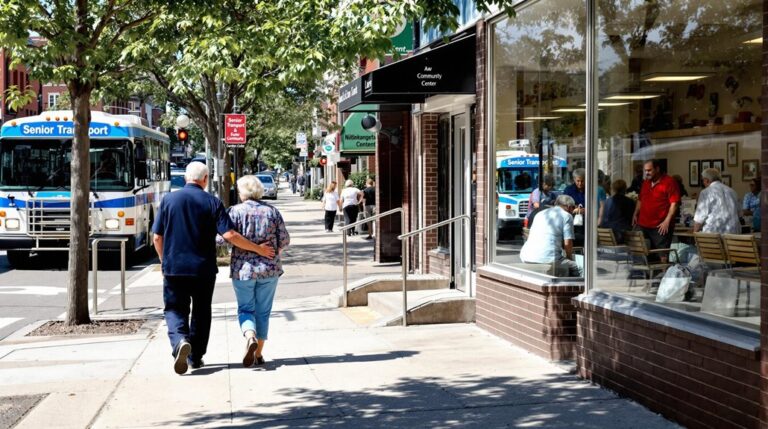North Jersey’s senior transportation landscape reflects an inclusive network of services designed to maintain independence and mobility for older residents. From county-operated paratransit systems to innovative partnerships with ride-sharing platforms, the region demonstrates a commitment to keeping seniors connected to essential services and social activities. The evolution of these transportation options reveals both challenges and opportunities as communities adapt to serve an aging population’s diverse needs.
Key Takeaways
- County-based paratransit services offer door-to-door transportation for seniors 60+ with advance reservations and donation-based fares in North Jersey.
- Access Link provides ADA-compliant transportation services throughout North Jersey, operating alongside regular NJ TRANSIT bus routes.
- Bergen County Community Transportation serves seniors 60+ with dedicated vehicles and trained drivers for medical appointments and essential trips.
- Ryde4Life partners with Uber to provide technology-assisted transportation solutions for seniors who need reliable rides across North Jersey.
- Medical transportation services include Atlantic Ambulance and Essex County Special Transportation for non-emergency medical appointments and healthcare visits.
Understanding County-Based Paratransit Services
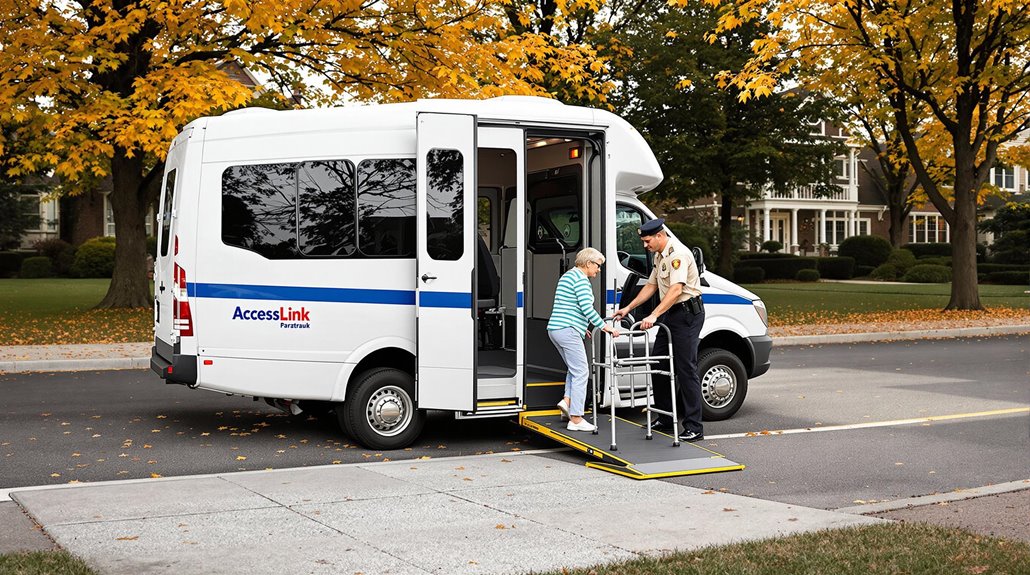
County-based paratransit services across New Jersey provide essential transportation solutions for seniors aged 60 and above, offering an extensive network of mobility options tailored to meet diverse needs.
Five major counties – Bergen, Essex, Hudson, Morris, and Passaic – operate dedicated transportation systems with specific contact numbers for scheduling rides.
Each county service maintains distinct eligibility criteria, focusing primarily on senior residents while accommodating those with disabilities and medical requirements.
County paratransit programs prioritize seniors while ensuring access for residents with disabilities and medical needs through specialized eligibility requirements.
Advance reservations are typically required, with most counties implementing a 48-hour notice policy through their designated scheduling systems.
Services encompass both in-county destinations, such as shopping centers and medical facilities, and out-of-county travel for specialized healthcare appointments, operating on a donation-based fare structure that guarantees accessibility for all seniors.
Key Demographics Shaping Senior Transit Needs
As New Jersey experiences significant demographic shifts, the growing senior population presents unique challenges for transportation planning and service delivery.
The state anticipates that seniors will comprise 23% of its population by 2050, with particularly rapid growth in the 85+ age group. These demographic shifts are accompanied by diverse transportation preferences across racial and cultural lines, with the state’s population consisting of 56.93% White, 12.96% Black/African American, and 9.91% Asian residents.
While younger seniors aged 65-74 often prioritize convenience in their transit choices, older adults frequently require more specialized door-to-door services. Understanding these varied needs has become essential for developing effective transportation solutions that serve all segments of New Jersey’s aging population.
Urban vs. Suburban Transportation Patterns
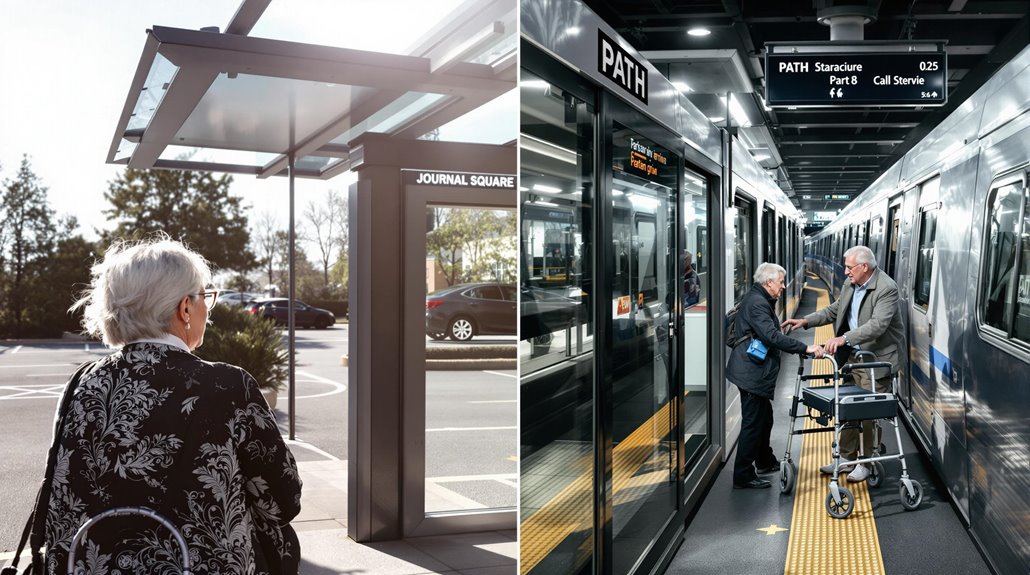
Transportation patterns among New Jersey’s senior population reveal stark contrasts between urban and suburban environments. Urban transit systems serve a higher proportion of seniors, particularly in Newark and Jersey City, where frequent trips for shopping and medical appointments characterize daily mobility.
Meanwhile, suburban isolation presents unique mobility barriers, with seniors relying heavily on private vehicles due to limited public transportation options. Service gaps and transportation equity concerns are particularly evident in suburban areas, where lower trip frequency reflects both infrastructure limitations and senior preferences for car-dependent lifestyles.
Cultural considerations also play a significant role, especially in diverse urban centers where approximately 34% of seniors have disabilities and face higher poverty rates. These demographic factors necessitate tailored solutions that address both accessibility needs and socioeconomic challenges across different community settings.
Available Transit Programs for Seniors
New Jersey’s extensive network of transit programs provides crucial mobility solutions for seniors through a combination of federal, state, and local initiatives.
Programs like Access Link offer ADA-compliant paratransit services, while senior discounts provide 50% fare reductions on fixed-route buses and trains.
Local transit options, such as Bergen County Community Transportation and Hudson County Transcend, specifically serve seniors aged 60 and above, ensuring reliable transportation for medical appointments and essential activities.
The state distributes approximately $98 million annually through various funding sources, including Section 5310 and Casino Revenue Fund, to support these critical services.
Area Agencies on Aging coordinate additional community-based support, including travel training and home services, creating a thorough transportation network for elderly residents.
Planning for Future Senior Mobility
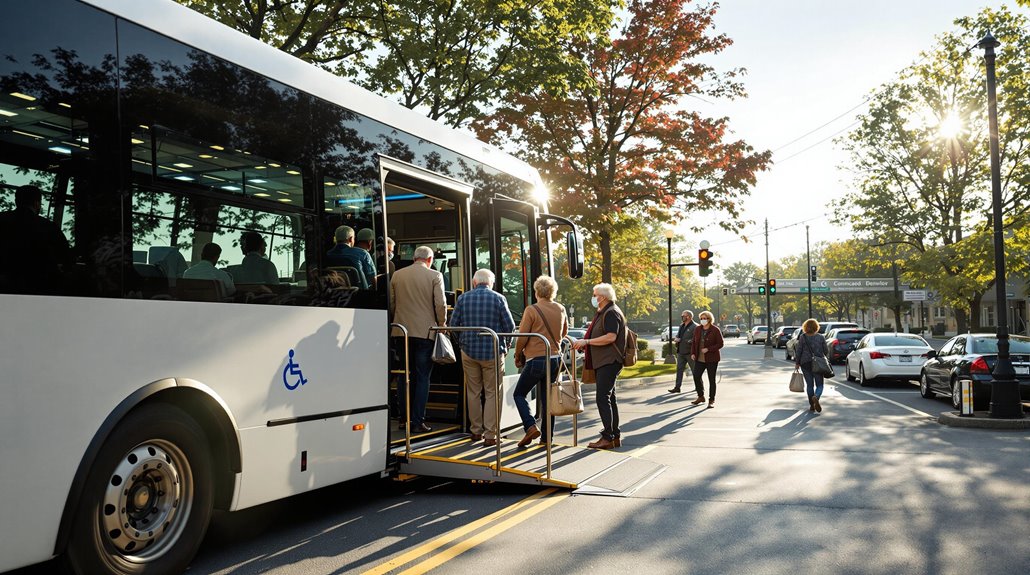
With demographic trends indicating a growing senior population, strategic mobility planning has become a cornerstone of New Jersey’s transportation initiatives. Regional authorities, including NJTPA and county boards, are collaborating with Rutgers University to develop all-encompassing solutions that address future mobility trends.
The 2023 Plan Update incorporates stakeholder feedback and demographic analysis to guide resource allocation for enhanced transportation services.
Future innovations focus on integrating Mobility on Demand solutions and data-driven trip planning tools, while strengthening existing programs like county-based paratransit services.
Complete Streets policies guarantee accessible infrastructure development, and mobility management platforms streamline service coordination across counties.
These strategic initiatives align with broader regional plans, including Plan 2045 and Together North Jersey, guaranteeing sustainable transportation solutions for the aging population.
Accessibility and Safety Features
Nearly all senior transportation services across New Jersey incorporate extensive accessibility and safety features designed to accommodate riders with varying mobility needs.
Lift accessibility options include kneeling buses and wheelchair-equipped vehicles, while ADA-compliant platforms and elevators guarantee safe access at rail stations.
Safety measures extend beyond physical infrastructure through thorough training programs, particularly those offered by Hudson TMA, which focus on pedestrian awareness and hazard navigation.
To enhance mobility support, specialized safety steps assist ambulatory seniors during boarding, while documented caregivers provide additional assistance when needed.
These features, combined with reduced fare programs for seniors 62 and older, create an integrated system that prioritizes both accessibility and safety, guaranteeing comfortable transit experiences for elderly passengers throughout North Jersey.
Community Resources and Support Networks
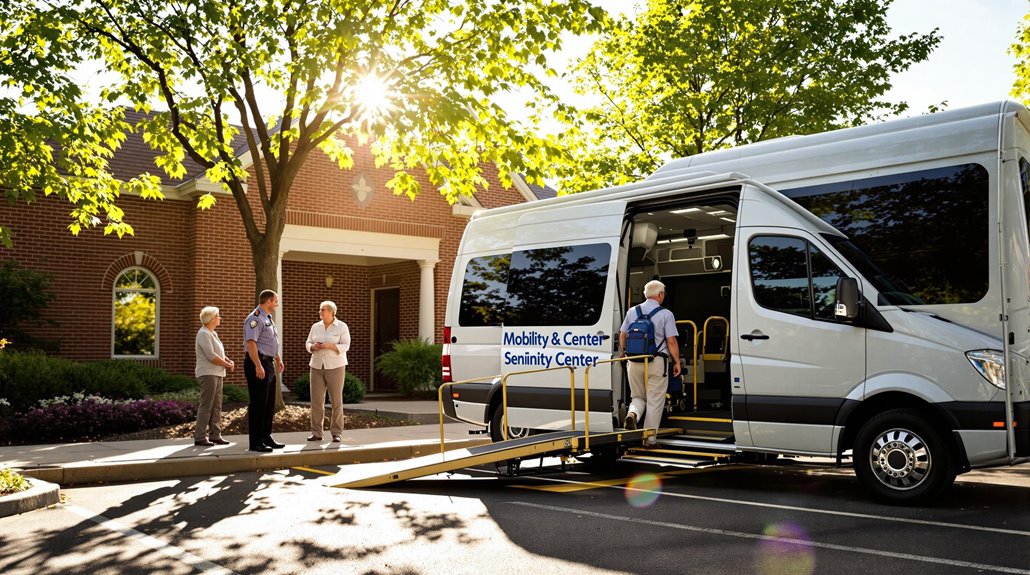
Extensive support networks throughout New Jersey complement the physical infrastructure of senior transportation services through interconnected community resources.
Atlantic Health System leads community partnerships by connecting seniors with county-specific transport options, while dedicated hotlines provide centralized assistance for eligibility and program navigation.
Resource awareness is enhanced through interagency collaboration between public transit and private providers, creating a thorough support system.
Partnerships between transit agencies and private transportation services improve awareness and accessibility of resources for seniors across communities.
Local organizations streamline access to services by facilitating reduced fare applications and coordinating between municipal programs.
The integration of NJ Transit’s Access Link with county-based paratransit and community shuttle services ensures seniors receive appropriate transportation assistance.
Organizations like EZ Ride further strengthen this network by offering specialized services that adapt to specific community needs and mobility requirements.
Cost-Effective Transportation Solutions
Senior citizens throughout New Jersey benefit from an array of cost-effective transportation solutions designed to maintain their independence and mobility.
NJ TRANSIT offers significant discounts of 50% or more on buses, trains, and light rail services for those 62 and older. Affordable ride sharing options through county-sponsored programs and community shuttle services provide additional flexibility, particularly for residents with limited means.
The 55 Kip Center in Rutherford exemplifies these services, offering door-to-door transportation with payment options including Medicare, Medicaid, and donations. Personal assistants can accompany disabled passengers at no extra charge, while shared rides and fixed routes help optimize costs.
These thorough services guarantee seniors can access essential transportation regardless of income level.
Special Services for Medical Appointments
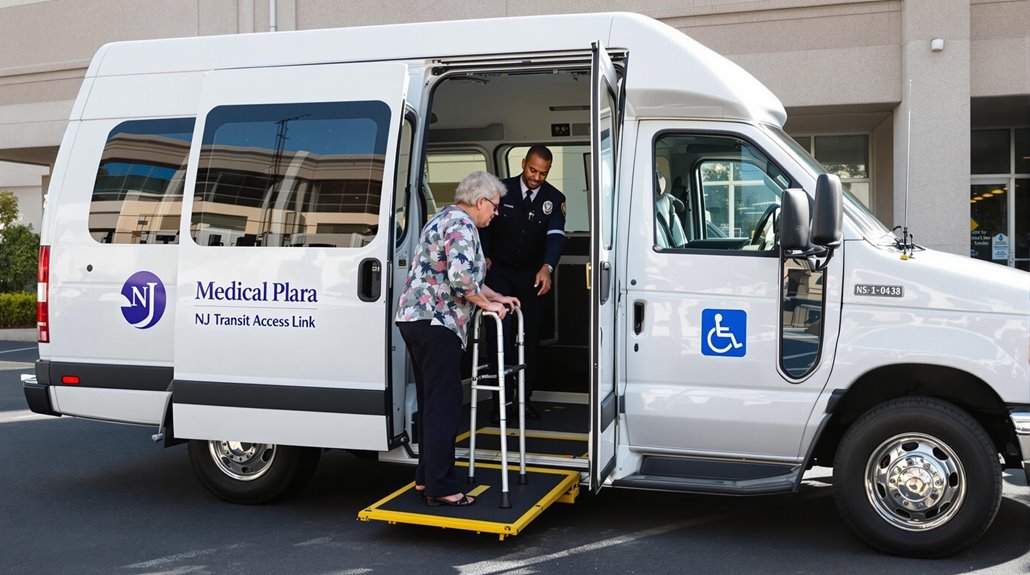
When medical care becomes a priority, New Jersey residents have access to an extensive network of specialized transportation services designed specifically for healthcare appointments.
Atlantic Ambulance provides advanced life support during transport, while Essex County Special Transportation handles non-emergency medical needs, including dialysis and chemotherapy appointments.
Services like Catholic Family & Community Services offer thorough support with medication reminders and appointment coordination, requiring 2-3 weeks’ advance notice.
For cancer screening transportation, ScreenNJ requires requests within three days of appointments.
Several municipal programs, including East Rutherford and Byram Senior Transportation, provide dedicated medical transport within specific service areas.
These programs often include door-through-door assistance and accommodate mobility aids, ensuring seniors receive safe, reliable transportation to maintain their health and independence.
Technology and Senior Transportation
As technology continues to reshape transportation services across New Jersey, innovative solutions are emerging to help seniors navigate their communities more effectively.
Smart mobility initiatives like Ryde4Life’s partnership with Uber demonstrate the growing integration of digital solutions for elderly transportation needs. NJ TRANSIT’s enhanced mobile applications now offer real-time information and accessible trip planning tools specifically designed for seniors who may be less tech-savvy.
Digital transportation solutions are evolving to serve seniors better, from ride-sharing partnerships to user-friendly transit apps designed for older adults.
The implementation of smart bus technology and signal preemption systems in Monmouth County has improved service reliability, while digital inclusion efforts guarantee these advances benefit seniors across various technological comfort levels.
From automated safety controls on trains to wireless bus systems that optimize traffic flow, these technological advancements are creating a more connected and accessible transportation network for New Jersey’s growing elderly population.
Bottom Line
North Jersey’s senior transportation landscape demonstrates a thorough approach to mobility, combining traditional paratransit services with modern technology solutions. Through county-based programs, partnerships with ride-sharing platforms, and specialized medical transport services, the region effectively addresses diverse senior transportation needs. As the aging population grows, continued investment in accessible, affordable transit options remains essential for maintaining independence and quality of life for North Jersey seniors.




